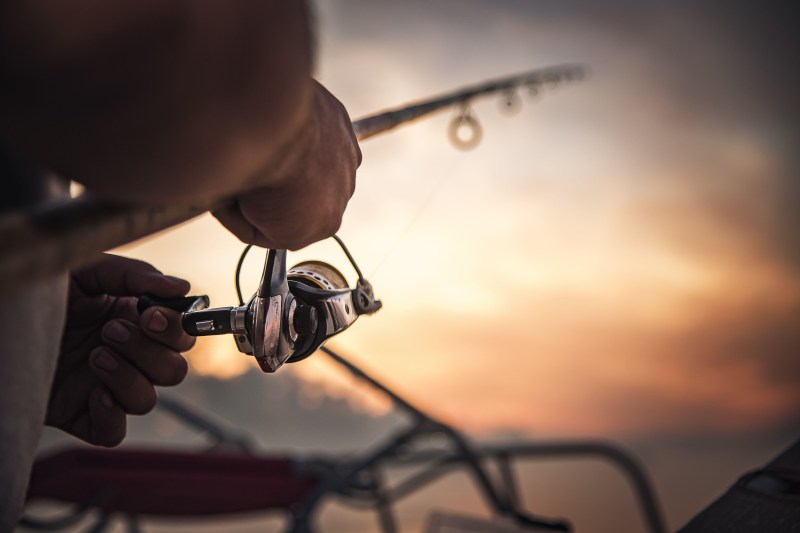
Some folks struggle with the idea of a sport taking place without an officially defined field, court, pitch, or course. Somehow it’s okay to accept golf, bowling, shuffleboard, and table tennis, but not fishing. Is fishing a sport or a hobby? I’ll make the case that it is both.
Sport: An activity involving physical exertion and skill in which an individual or team competes against another or others for entertainment.
Hobby: An activity done regularly in one’s leisure time for pleasure.

Fishing is a sport
Fishing is a challenging but fun water sport suited for vacations, recreation, and sometimes, for competitive play. Anyone who has ever tried it knows that fishing can lead to success or failure. Catching a fish requires knowledge, skill, and physical ability. Competition is part of the equation, too — angler versus fish, and angler versus angler.
Some naysayers argue that putting a boat into the water, then drifting around with a line in the water while kicking back and enjoying a few beverages is not a sport. Well, they are wrong. Is golf not a sport simply because some players drive golf carts? There are aspects of fishing that may not appear as a sport to those with a particular bias, but fishing is sport nonetheless.
An angler must acquire the knowledge to plan a fishing trip. For example, if they want to catch trout, they have to fish in a stream or lake where trout live, using equipment of the right size and strength to catch trout without being too heavy or light. They have to choose the right lure, or more precisely, bring a selection of lures most likely to attract trout, given the time of year, water clarity, weather conditions, and other factors. So, before they even leave home, they must have prepared mentally for the challenge ahead, much like other athletes commit to their sports.
Upon arriving at the stream or lake, the angler heads out on the water with their gear. They walk intentionally and stealthily so that the fish are not spooked by the approaching shadow or vibrations transmitted through the water. They read the water with a skillful eye to determine where the fish may be located. Then, they skillfully cast the lure (that was tied to the line with just the right knot) to the preselected spot. If a fish takes the lure, the angler uses a precise motion to set the hook into the fish’s lip; otherwise, the fish gets away. As a sign of good sportsmanship, anglers often use barbless hooks that make landing the fish more difficult, in order to avoid damage when removing the hook from the fish’s lip.
As the angler reels in the fish, they must be careful to hold the rod at a precise angle (hence the term “angler”). They hold tension on the line and gradually reel the fish in, but if the fish pulls back too hard, they let it take out the line to avoid breaking it off. When the fish changes direction, slows, or stops, the angler again takes up the slack and works to bring the fish in. The fight may last 30 seconds, or it could go on for several minutes. All the while, the angler is standing, walking, and wading on uneven ground, over boulders, under tree branches, and in chest-deep water. Even when things seemingly go perfectly, there is no guarantee of a catch until it is in hand.
Oh, and by the way, let’s not forget that, like other athletes, anglers follow rules. They purchase a license, and in some cases such as trout fishing or saltwater fishing, they buy additional licensing. They must abide by rules dictating where they can fish, the type of equipment they can use, whether or not they can keep a fish that they catch, and more. Only in fishing, when you break the rules you pay a fine, go to jail, and your truck may be confiscated.

Fishing is a hobby, too
Like other sports, fishing requires numerous mental and physical skills in order to achieve success. The only way to find real success fishing is to patiently dedicate time and resources to learning and practice. While there may be considerable downtime during a fishing trip, the physical acts of casting and landing a fish require specific, precise movements that are intuitive — they must be learned. An active day fishing, catching multiple large, aggressive fish, requires stamina. Catching sunfish in a pond with a 4-year-old is the fishing equivalent to shooting hoops in the driveway, simply a starting point.

Is bass fishing a real sport?
You better believe it is and there’s a pretty penny in that racket. Bass fishing is also widely popular, with an estimated half a million members of the Bass Anglers Sportsmen Society alone. Major League Fishing is a real thing, built around tournaments with significant prize payouts, kind of like golf. These gatherings take place all over the nation, involve the best fisherman in the land, and are extremely competitive. Quantity and quality tend to produce the winners, as in most fish and the largest fish caught. Full-time pro fishermen, like pro golfers or top chefs, can do quite well for themselves.
Want more fishing content? Here’s our fly-fishing guide and some fishing tips for beginners. Like to cook and eat fish? Be sure to pair seafood and wine and expert tips for cooking salmon.


